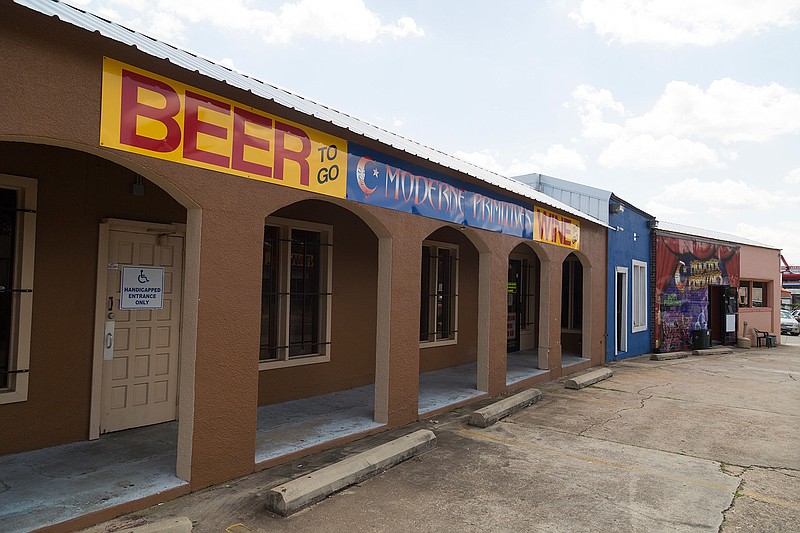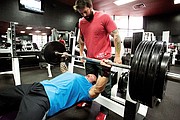Its beer and wine monopoly broken and grip on hard liquor sales slipping, Texarkana, Ark., faces a new economic reality that threatens both business and government.
After more than 80 years of reaping most of the area's retail alcohol spending-and the associated sales tax revenue-the city now faces increasing competition not only in Northeast Texas but also in adjacent Little River County, Ark. The resultant losses, combined with other economic pressures, have made the municipal budget tighter than ever before and left mom-and-pop liquor stores with little margin for error as concern grows about their ability to remain open.
Beginning in 2013, city elections in Cass County and formerly dry Bowie County in Texas, including the third try in Texarkana, Texas-literally across the street from Texarkana, Ark.-have allowed beer and wine in stores much closer to buyers who previously had to travel to the Arkansas side for their alcohol supply.
Arkansas-side sellers' only remaining advantage, the ability to offer hard liquor, soon could be a thing of the past, as well. Little River County elected last November to allow not only retail beer and wine sales but also two standalone stores that can sell liquor. Eleven businesses have applied to compete for those two store licenses.
Maud, Texas, followed this May by becoming the first Bowie County city to allow liquor sales. Those moves have left many in Texarkana, Ark., worried at the prospect of the hard stuff becoming available on the Texas side.
"It makes me real nervous, there's no question, because our margins are so thin," Texarkana, Ark., City Manager Kenny Haskin said. "A little bit here and a little bit there in a clutch this tight makes a world of difference for us. We have no fat really to trim off, so if we start to hemorrhage in terms of sales, then we're right at the bone. So we have to make sure that we're extremely conservative about our approach, that we're not too aggressive. We're not panicking at all, but certainly we hear the alarm."
CITY COFFERS COULD TAKE A HIT
The city's total sales tax revenues rose from almost $5 million in 2002 to more than $7.07 million in 2015 and then took an uncharacteristic tumble, according to Arkansas Department of Finance and Administration records. The figure dipped 1.6 percent, more than $115,000, from 2015 to 2016. That loss in sales tax revenue, in addition to lower income from franchise fees, led to a 3.24 percent decrease in the city's general fund revenue, a drop feared to be a harbinger of financial woes to come.
"I expect our sales tax revenue to be negatively affected by the changes in beer, wine and liquor sales," finance director TyRhonda Henderson said.
City Hall has responded with a variety of belt-tightening and money-making measures. Haskin has cut staff and decreased work hours for some who remain. The Board of Directors has added or raised a long list of animal shelter, fire department and public works fees. And the city is even passing the proverbial hat, asking for a voluntary $10 donation on every property tax bill.
"We've had some drastic cuts to our administration budget, to record lows. We respond the way we've always responded to citizens' needs, but in terms of having the resources that other cities have, we just don't. And things are only going to get more expensive over time. Yet our sales tax is flatlining, and a lot of that has to do with alcohol sales. So now we're saddled with trying to put together creative initiatives in hopes to generate revenue to offset our escalating expenses," Haskin said.
SMALL VENDORS FEELING THE PINCH
The city's small, independent liquor stores are also adjusting to the new Texas-side competition.
"We've lost a considerable amount of business. Our wine sales have dropped to nearly nothing, and the beer, as well. I'd say about 60 to 70 percent is just the hard liquor. Once it dropped off, it just stayed down there; it didn't come back," said Brent Hughes, store manager at BJ's Refreshment Center, which has operated on North State Line Avenue for more than 40 years.
"We're trying to stay competitive with our pricing. And then, if we can do any advertising, which it's tough to do, we'll try and do some advertising."
Ben Brewer, owner of Southtown Liquor on East Street for the past 16 years, is seeing similar cause for alarm, and said his purchasing practices have changed dramatically since the Texas side went wet.
"Our wine sales are probably down at our store 70 percent," he said. "You're obviously ordering much, much less. It's taken about a year to determine what you're absolutely going to sell. You can't take a chance on anything anymore. New products come out, but unless there's something you think is going to be a guaranteed seller, you say forget it, you don't even order it. The only people that get hurt are the liquor stores, period."
The challenges of ever-increasing competition come as stores like BJ's and Southtown are squeezed by larger stores' and chain retailers' buying-power advantage.
Texarkana, Texas-based convenience store chain E-Z Mart, for example, sells beer and wine in 83 percent of its 300 locations, up from 70 percent just five years ago, CEO Sonja Hubbard said in an email. In those stores, alcohol sales make up almost 25 percent of non-fuel sales. The company also operates a standalone liquor store called E-Z Street Liquor in Texarkana, Ark., and sells hard liquor in some Louisiana locations.
"Between 'must have' and 'nice to have,' selling beer and wine would probably fall into the 'very nice' to have range" for the company, Hubbard said. "While low-margin items, they do provide volume that helps offset costs of operations and ensure more financial stability and viability."
That volume may be great for E-Z Mart, but it makes staying viable hard for the little guy, Hughes said.
"It really hurts us in the way we buy the alcohol, because we have to pay more if you're not able to order the big deals. Then you pay more per bottle than anyone else, and when you start doing that, you're going to fold up if you can't come out of it. We're a small store to begin with, and it's just difficult," he said.
Brewer added that the state recently raised liquor license fees and a law just passed by the Arkansas Legislature has made it practically impossible to compete with larger stores in selling wine. Dubbed by some the "Walmart Law," it allows grocery and convenience stores to sell wine from large-scale manufacturers, not just small vineyards as had been allowed previously.
"It's a shame. You try to get through the storm, but I tell you, the state is no help to any of us. We had already been kicked hard down here by the wine sales in Texas, but when this Walmart Law got passed, the rest of the state got screwed," he said.
Store chains Walmart and Brookshire's did not respond to interview requests for this story.
Hughes is pessimistic about what would happen if the Texas side began selling hard liquor.
"I believe that some of us will go out of business immediately. That might be us. There's just not enough to go around. If they did that, I don't see how everybody would stay in business," he said.
Brewer agreed.
"It would be bye-bye liquor stores in the city, except for the two very big stores, Chubby Cheeks and The Party Factory," he said. "I would suspect that there are quite a few liquor stores just sitting on the edge."
Still, some say liquor sales are profitable enough that allowing them in Northeast Texas is inevitable.
"It'll come. Hard liquor will come on the Texas side, but I don't know when it'll be. I'm going to say within five years," said Sandy Spades, owner of Texas-side smoke shop Moderne Primitives. Spades gave beer and wine sales a try but says the economics involved made them a bad fit for the otherwise successful shop.
"It never really caught on, and it was never profitable for me. There's no margin on beer and wine. I decided to get out of it, so I'm going to sell everything off," she said.
"Now if I had had hard liquor, it would have been great. There's a good margin on hard liquor, and I think it would bring people in."
Members of the Texarkana, Ark., Board of Directors contacted for this story did not comment.


